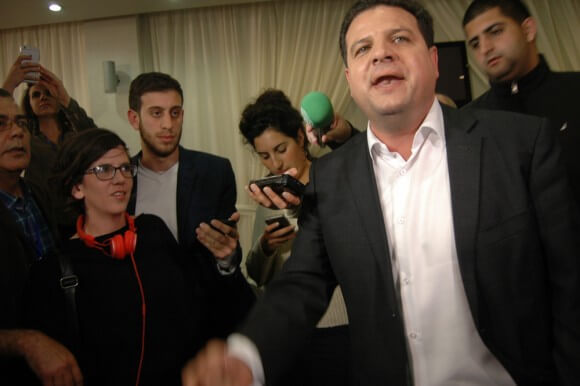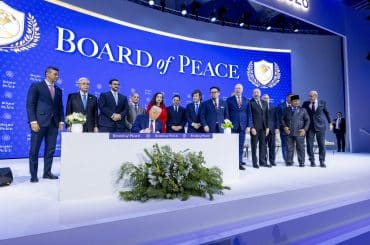Israeli President Reuven Rivlin, who is the surprise foremost senior official to address inequality over the past year, is set to make his most ambitious policy recommendations for Palestinian citizens of Israel in a speech Sunday at the Interdisciplinary Center (IDC) Herzliya.
Rivlin will unveil a steering committee that will seek reforms affecting Palestinian citizens of Israel. According to sources close to Ayman Odeh, leader of the Joint Arab List, the chief issues discussed will include a possible one-year moratorium on Israel’s practice of home demolitions for administrative purposes, a path for legal construction inside of all Arab cities, and a comprehensive plan to address unrecognized Bedouin villages, where 180,000 Bedouins citizens live without access to basic services are all at risk of eviction and demolition. The committee will be comprised of “academics and business executives from all sectors of Israeli society,” said the president’s spokesperson in a statement today.
The Joint Arab List (JAL) is Israel’s third largest party and Odeh enjoys a close relationship with Rivlin. The two speak regularly and are said to share many goals. Odeh’s party championed an end to home demolitions and the rights of Bedouins during campaign season last spring. Both issues have top billing in Rivlin’s forthcoming government plan.
Even so, the two leaders have deep differences. Rivlin does not back Odeh’s two-state approach. He supports a “Greater Israel,” where he envisions Palestinians will achieve rights under the banner of a Jewish state with binational characteristics. This idea is set to be echoed in his speech on Sunday where will introduce the concept of a “joint Israeli society” —a notion of who is an Israeli will be expanded to include on equal-footing four segments: Secular-Israelis, religious nationalist, secular nationalist, and Palestinian citizens of Israel.
“Whether we like it or not the ‘structural ownership’ of Israeli society and the State of Israel is changing before our eyes. A boy from Beit-El [a settlement], a boy from Rahat, a girl from Herzliya and a girl from Beitar Illit are educated with completely different approaches,” he will say, according to an early release of the speech–conspicuously dropping the name of an established nationalist settlement (Beit El) into the fold of his new agenda.
“Are we, as members of the Zionist public, able to accept that two major groups which will make up half of the future population of Israeli, do not define themselves as Zionists?” Rivlin will ask. “Whoever is not willing to ask these questions today is not more or less of a Zionist or a Nationalist, but one who is ignoring the most significant challenge put before the Zionist enterprise today.”
Rivlin laid the ground for the recommendations in a speech to a co-existence group last week that addressed Palestinian discrimination: “My independence is your catastrophe. You build your identity which negates mine, and I build my identity which negates yours. This basic and formative experience, stands at the very core of the Israel-Palestinian conflict–which has long since turned into a tragedy.” Receiving a prize for his work on reconciliation, Rivlin quoted beloved Palestinian poet Mahmoud Darwish and made reference to the Nakba, when more than 700,000 Palestinians were expelled or fled during the 1948 war. Sharing the stage was Odeh,.
The committee of experts will meet over the next year under the leadership of the president. They expected to consult directly Arab-Palestinian citizens, among other civil society sectors. It will submit a four-chapter program to the government at the next IDC conference in 2016. In previous government bodies similarly convened, Palestinian citizens of Israel were near uniformly kept out of the decision making process.
Broadly, the precepts developed by Rivlin’s task-force will examine inequality in land use, social services, education, poverty, and “cultural autonomy,” said the president’s spokesperson. Under the header of land rights, the group is expected to pay special focus to demolitions. While the president will not seek the removal of a building law dating to 1965 that codified Israel’s use of home demolitions, he will review other options to moot the policy’s effects—at least temporarily. This will also include creating a pathway for Palestinian citizens of Israel to receive building permits from the government. Meaning, neither Israeli law, nor the structure of the state will be challenged through the meetings. Rather a balloon package of reforms will be proposed to override specific areas of discrimination.
It is not clear if East Jerusalem will be included in the discussions, a region of high rates of home razing. It is part of the occupied Palestinian territory, although East Jerusalem has been administered by Israeli law since the 1980s. Therefore it should benefit from the president’s plan unless specifically excluded. In 2014 Israel demolished 51 units in East Jerusalem, making 167 people homeless according to the Israeli human rights group B’Tselem.
Also not mentioned will be the Palestinians living under occupation in the West Bank and Gaza, according to sources close to Odeh.
“Civil rights and equality for Arab society,” will heavily guide the course of Rivlin’s future work, a spokesperson for Odeh, Anan Maalouf, said. Odeh will speak at the conference too—along with Prime Minister Benjamin Netanyahu, and nationalists leaders Naftali Bennett and Tzipi Hotovely, all of whom have drummed against the creation of a Palestinian state over the past few weeks. By contrast Odeh will relay “the right of the Palestinian people to have their own state, their own nation,” Maalouf said. His audience will include every major Israeli politician not to mention former French president Nicolas Sarkozy.
Odeh’s upcoming remarks should be watched closely. Few Arab leaders have been invited to the podium and the subjects usually stick close to security, Iran, and Israel’s economy. For Odeh his highest priority is “lands,” he told Lally Weymouth days ago, the senior associate editor of the Washington Post known for her sit-downs with chiefs of state. In the interview he said, “We are 18 percent [of the population], but we have 2.5 percent of the lands.”
Odeh has clearly surpassed opposition leader Isaac Herzog of the Zionist Camp in garnering headlines in international press. The exact extent to which his sway will translate in government has yet to be seen. But his coming speech Sunday will serve as an indicator for his platform while in office.



“Odeh has clearly surpassed opposition leader Isaac Herzog of the Zionist Camp in garnering headlines in international press.”
Like choosing musakhan over a slice of white bread.
Rivlin’s proposals are in the direction of achieving one of BDS’s three goals — a non-discriminatory Israel-48. What about BDS’s other two goals?
Since Rivlin seems not to favor an Israeli withdrawal from OPTs, one must point out to him — question him! — as to his intent for a follow-on to today’s apartheid one-state regime. Does he favor full citizenship for all who live within The Land? Does he favor a fully non-discriminatory rule of law for all residents of The Land as he is suggesting he does for Israel-48?
L:astly, perhaps it is too early to tax him with the question of PRoR which, in a 1SS, would be a question about the return of refugees (exiles) to the entire territory once called Palestine rather than a question of a return only to WB&G as the question might have seemed to some (Zionists only!, not UNGA) in the context of a 2SS based on the green line.
This is why Peter Beinart is so myopic and wrong regarding one state. When he says “nobody on either side,” “no way,” and “never” about one state, little embryonic relationships like this put the lie to those kinds of absolutist, my-way-or-the-highway/just-because-I-say-so/pure preference, projection ravings.
Who knows how hard it’s going to be or how long it’s going to take, but so it begins…
“Since Rivlin seems not to favor an Israeli withdrawal from OPTs, one must point out to him — question him! — as to his intent for a follow-on to today’s apartheid one-state regime. Does he favor full citizenship for all who live within The Land? Does he favor a fully non-discriminatory rule of law for all residents of The Land as he is suggesting he does for Israel”
Good questions Pabelmont. My own observations are that Rivlin says the right things but remains vague on the specifics. The cynical side of me (which these days is over 99% of me) tells me that he’s more interested in repairing Israel’s international image than anything else.
But I might be suffering from (understandable) irreversible chronic cynicism. Terrible affliction
It seems the most rational outcome of the last 50 years would be a single, multiethnic state with a declared and legally binding bill or rights for all of those living within Israel/Palestine. It wouldn’t hurt to declare lands still in Palestinian control semi-autonomous regions with the goal of eventual unification through Palestinian plebiscite.